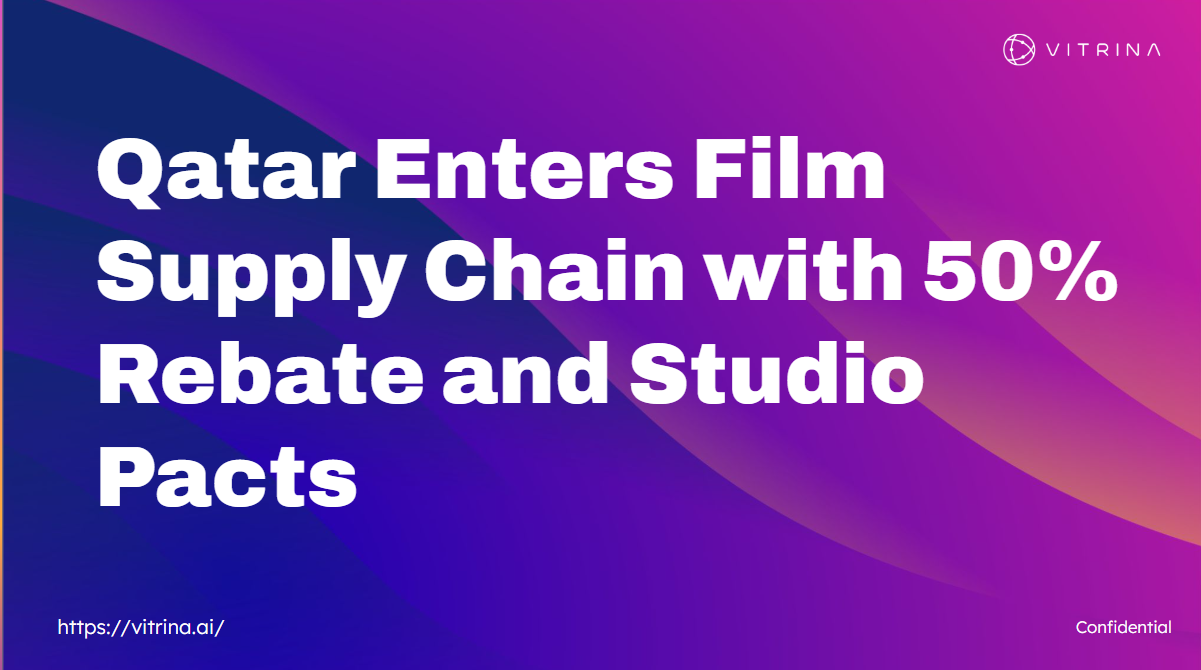Deal Overview
The Qatar Film Committee (QFC) executed a coordinated market entry last week through five simultaneous agreements. The QFC partnered with Sony Pictures International Productions (SPIP), Miramax, and Neon to co-finance, develop, and distribute Arabic and regional content. In a specific production pact, US banner Department M and Doha-based Katara Studios will co-produce Caesar, a biopic of the Syrian military defector. Concurrently, global post-production firm Company 3 agreed to establish a VFX and finishing facility in Doha. These deals coincide with the launch of the Qatar Screen Production Incentive (QSPI), a 50% cash rebate for production and post-production—the highest headline rate in the region.
Parties & Dealmakers
Qatar Film Committee (QFC): Led by Chairman Hassan Al Thawadi, the entity is financing and incentivizing the ecosystem. Sony Pictures International Productions (SPIP): The studio will co-finance and co-produce multiple Arabic films. Key exec: Steven O’Dell (Head of International Marketing & Distribution). Miramax: The beIN Media Group-owned studio will produce an Arabic remake of Serendipity and co-develop original content. Key execs: CEO Jonathan Glickman and MENA Head of Content Lucy Dertavitian. Neon: The US distributor will co-finance and develop 6–10 films over four years. They are also attached to distribute the Caesar biopic. Key exec: Founder & CEO Tom Quinn. Department M / Katara Studios: US production company Department M (founded by Mike Larocca) will partner with Doha’s Katara Studios to produce Caesar, a biopic exposing Assad regime atrocities. Company 3: The post-production vendor (owned by Framestore) will build a Doha facility and consult on the rebate’s technical implementation. Key exec: CEO Stefan Sonnenfeld.
Advantages, Uniqueness, Competition
Advantages: Qatar secures a foundational ecosystem of global partners. Local projects gain guaranteed distribution paths (Sony/Neon) and high-end technical support (Company 3). The US studios gain risk-mitigated access to the Arabic market with up to 50% of their qualifying production spend recoverable via the rebate. Uniqueness: This is a “infrastructure + IP” play. Unlike neighboring hubs that prioritized physical studios first, Qatar is simultaneously incentivizing intellectual property creation and post-production services. The 50% rebate is “untethered,” meaning it applies to post-work even if the film was shot outside Qatar—a mechanism designed to capture high-value technical work regardless of where the camera rolls. Competition: This challenges Saudi Arabia (Neom/AlUla) and Abu Dhabi (Image Nation). Saudi Arabia offers a 40% rebate and massive physical backlots but lacks a dedicated tier-one global post-production facility. Abu Dhabi has a mature service sector but a lower rebate cap (30%). Conclusion: Unique. The arrival of a major distributor (Sony), a prestige indie (Neon), and a technical vendor (Company 3) does not instantly fix the supply chain, but it provides a “turnkey” credibility that usually takes years to build, allowing Doha to bypass the typical initial phase of attracting only service work.
Supply-Chain Impact
The Company 3 deal signals a serious intent to localize technical workflows. Previously, high-end productions shot in the Gulf but sent dailies and finishing work to London or Los Angeles. A Doha-based hub creates the option for a regional finishing workflow, potentially reducing data transfer costs and turnaround times. It acts as a magnet: regional producers may now choose to finish their films in Doha to capture the 50% rebate, slowly building a local technical ecosystem around the anchor tenant.
Vitrina Perspective
Qatar is opting for a “Hybrid” strategy: combining prestige credibility with commercial viability. The partnership with Neon—distributor of festival hits like Parasite—suggests a clear target for critical acclaim and awards rather than just box office volume. Meanwhile, the Caesar project with Department M and Katara Studios indicates a willingness to tackle politically weighty subjects. However, the ultimate test for Qatar will be moving beyond headlines; the challenge will be turning these paper agreements into a sustainable pipeline of active productions.







